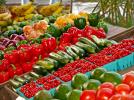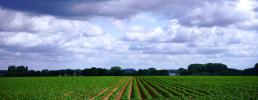H2020 BIOFRUITNET Project: Promoting innovation in organic fruit production through strong knowledge networks
- Type Project
- Status Filled
- Execution 2019 -2023
- Assigned Budget 1.999.302,5 €
- Scope Europeo
- Main source of financing Horizon 2020
- Project website BIOFRUITNET
Organic farming is a rapidly growing sector in European agriculture, but increasing imports from outside the EU are making competition difficult. Some organic fruit producers are rising to the challenge and developing strategies to keep prices low. The problem is that the methods used, as well as the knowledge acquired, are known locally and rarely shared among EU producers. The EU-funded BIOFRUITNET project will create a network to compile and synthesize existing local and scientific techniques on improved organic fruit growing systems.
The overall objective of the project is to disseminate knowledge of best practices among EU farmers. This innovative platform will enhance the EU's competitiveness in organic farming.
The EU is the leading region in organic fruit production, with rapidly expanding production and a growing demand for organic products every year. However, at the same time, the quantity and value of organic imports from outside the EU are increasing. For EU organic fruit producers, this represents a challenge for success in an increasingly competitive market. Furthermore, organic fruit growing is a highly demanding agricultural activity. This is because the sector faces specific problems that cannot be solved using conventional approaches based on the use of synthetic substances.
Since organic fruit producers cannot rely on synthetic inputs, many of them have developed competitive strategies locally to improve plant health. Furthermore, there is considerable research on improving organic fruit growing systems. The problem, however, is that this knowledge is not easily accessible to farmers across Europe and remains locally known or available only in the scientific sphere. The sector needs a network focused on organic fruit production that bridges the gap between science and practice and makes locally developed solutions available to other fruit producers in Europe.
Therefore, the specific objectives of BioFruitNet are:
- Collect and synthesize existing knowledge ready for practice.
- Create a stable European innovation network.
- Strengthen established networks.
- Distribute solutions widely.
- Expand the Organic Agriculture Knowledge Platform.
To achieve these objectives, we will first conduct a comprehensive mapping exercise to identify relevant networks at the country level in partner countries and beyond (WP1). We will then compile all existing practical and scientific knowledge relevant to organic fruit producers (WP2) and select best practices (WP3). We will then focus on adapting and translating all the best practices into easy-to-understand formats, such as practice summaries (WP4), and disseminating the information through high-impact channels (WP5).
Knowledge exchange among organic fruit producers in Europe. Organic farming is gaining popularity, but specialized knowledge is often restricted within national borders. The EU-funded BIOFRUITNET project worked to overcome this obstacle. Organic farming is growing rapidly in Europe.
However, in 2020, only 9.1% of total agricultural land in the EU was dedicated to organic production. Within the framework of the European Green Deal, the Farm to Fork strategy set a target of 25% of EU agricultural land to be dedicated to organic farming by 2030. Organic farming is challenging and technically demanding. Farmers face a number of difficulties for which they cannot resort to conventional solutions, such as soil management and fertilization, and crop protection. Many European organic farmers have developed their own agroecology strategies to improve plant health and optimize organic farming, but much of this knowledge is not widely disseminated, in part due to language and geographical barriers. "There is already a culture of information sharing through formally and informally established knowledge exchange networks in Europe," says Sophie Egerer of Naturland, coordinator of the BIOFRUITNET (Boosting Innovation in Organic FRUIT production through strong knowledge NETworks) project.
However, these networks operate primarily at the local level, and information on existing practical knowledge, in particular, barely crosses regional or national borders. The EU-funded BIOFRUITNET project aimed to overcome this communication problem by creating a knowledge network, both online and offline, to collect and share local and scientific knowledge on organic fruit growing across the EU, in local languages. "BIOFRUITNET's contribution to making organic farming knowledge much more accessible to farmers across Europe is seen as a major effort to boost the transition to a greener EU," notes Egerer. Identifying Existing Agricultural Knowledge
The BIOFRUITNET team initially surveyed farmers, advisors, and their associations to identify existing knowledge-sharing networks in the EU and neighboring countries. A second survey, covering around 250 farmers and advisors from 12 EU countries, helped the BIOFRUITNET team identify and define the pests and diseases of greatest concern in organic orchards. This also revealed the level of adoption of orchard management practices suitable for organic farming, particularly those related to variety choice, fertilization, functional biodiversity, and crop protection. “We were able to gain an up-to-date and accurate view of the challenges facing organic fruit growers across Europe and identify the areas where BIOFRUITNET could be most beneficial to them,” adds Egerer.
The team then reviewed the existing scientific and gray literature to prepare a wide range of communication materials to overcome the language barrier. Now available in 10 languages, they include 30 short technical videos, 100 practice summaries, five podcasts, and three e-learning courses, each consisting of four to five modules of approximately half an hour each. A Growing European Organic Knowledge Network The new BIOFRUITNET knowledge materials provide a solid foundation for training in organic fruit growing, while the communication networks will enable greater direct knowledge exchange among organic fruit producers in Europe. “The creation of a European network of knowledge networks is designed to maintain and further develop knowledge transfer in the future,” says Egerer.
The EU's network of knowledge networks is also designed to ensure the continuity of the project's work after its conclusion. Since the project transcended EU borders, integrating knowledge networks from non-EU countries in Europe and the Mediterranean, its impact would benefit a broader transition toward more sustainable agriculture. "These countries include those where organic fruit production is still in its infancy, and therefore there is enormous potential for the transition to organic farming," Egerer concludes.
- NATURLAND - VERBAND FUR OKOLOGISCHEN LANDBAU EV (NATURLAND)







